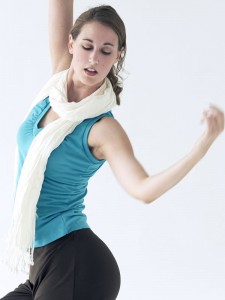Hi Framers! A very happy summer Monday to you! We are embarking on some exciting and fresh MFA Monday contributions this summer, and we are thrilled to begin with Rebekah Chappell. She is about to leave Houston for an MFA program and tells us here about how she chose a program. Reading this, I was impressed by how thoroughly she searched for the right program, and her very wise steps to get to her final choice. What do you think?

MFA Monday Part I:
For as long as I can remember, I have wanted to pursue my MFA in Dance. I love school. I love the community of learning, the diversity of disciplines and perspectives, the atmosphere of inquiry and exploration, the smell of new books, the hustle and bustle of the campus, and the fresh start every semester. Most of all I love the relationships that are built through discussion and inquiry. I have been researching Graduate Schools for years, taking notes, making lists, and asking every MFA graduate I know about the process. This past winter I auditioned at Smith College, The University of Maryland, and The University of Iowa. I accepted an offer at The University of Iowa, and will begin Fall 2014. Here are a few things I learned in the process and questions I encourage you to ask if you are considering returning to school.
Researching programs:
What are you looking for in a program? As I began my research, I had a short list of must haves including the opportunity to teach, as well as emphasis on improvisation, somatic practices, and choreography for alternative spaces. My deal breaker was financial aid. I only applied to programs that offered a full tuition waiver to ALL students accepted into the program. While this greatly reduced my options and made the programs extremely competitive, I knew that if I was accepted into a school without financial assistance, I would be too tempted to take out loans. Tuition waivers are generally part of package labeled as a scholarship, fellowship, and/or assistantship. These appointments can include different responsibilities in the dance department such as teaching and administrative work. At The University of Iowa, I will be responsible for teaching three classes a year. In the fall, I am currently scheduled to teach Continuing Ballet to non-majors.
Many MFA programs have an emphasis in either performance or choreography. Some programs offer tracks in both areas, allowing you to select the track that meets your goals. Regardless of your preference, take a very close look at the required and elective courses offered at each school, and gage your interest in each class. For example, I was not excited about taking mandatory ballet classes. I wanted the freedom to decide what my movement practice entailed. I ruled out schools that required mandatory technique classes in ballet.
Most programs also have a MFA handbook that contains specific details about expectations, timelines, and descriptions of required assignments and coursework. Some schools post these handbooks on their websites, if the handbook is not readily available online, check to see if the school would be willing to email you a copy. This detailed document will let you know what to expect of each program, and what each semester may look like. Personally, I was able to rule out a program on my short list after I examined the required summer reading list. I realized that the faculties’ interest did not match my own.
Lastly, at most schools there is a professor assigned to graduate recruiting. I contacted these professors and had a Skype conversation to further discuss their programs the summer before auditions. I found that during the summer, faculty had more time available to converse. In my experience, how you are able to interact with your teachers is a key component in learning. I wanted to see how we might get along and relate before applying. I was grateful that I had this opportunity as the audition experience is condensed into one or two days, and it is difficult to have in depth conversation.
The application and audition process:
Why do you want to go to graduate school at this time? Why did you apply to our program? What do you hope to research / explore / learn while you are in school? Every program I looked into asked these three questions at one point or another. These are the crucial questions that help determine whether you are accepted. More and more artists are returning to Graduate School; the pool of candidates I encountered were driven, successful and had a diversity of talents and experiences. Schools are looking for applicants who are going to be a good fit for their specific program. It is important to tailor your answers to each program and be specific and clear with your intentions.
In retrospect I wish I had answered those last two questions differently. I noticed while auditioning that most programs have their “claim to fame”, something they are proud of and that sets them apart from other schools. For me, that was the thing that had drawn me to their program. I felt silly sharing details about their program in my application, as I felt it was redundant. If I had to do it again, I would be more specific in mentioning those strengths and how they would help me accomplish my goals in a tangible way. Make sure you address in your application how their program will help you achieve a specific goal as it shows that you did research and that your interest and goals align with the program. Remember that a MFA program is two- three years long; be realistic about what you can do in that amount of time.
Some schools offer the option of staying with a current graduate student during your audition visit. I highly recommend this experience. While the accommodations may not be private or luxurious, it provides valuable insight into your potential quality of life. All three of the places I auditioned would have resulted in relocating to a new region of the US. I learned a lot about the lifestyles of each area. For example, at The University of Iowa most students walk or take public bus transportation to school due to parking difficulties. This played a big part in the housing my husband and I end up selecting. Staying with a graduate student also provides a deeper insight into the dance department, and allows you to get to know a potential cohort better. I found that both parties were more honest in the privacy of the home.
Finally, don’t forget that your entire visit is an interview. While this may seem obvious, be sure to bring professional dress clothing to change into after dancing or teaching. I would recommend being able to walk outside comfortably in whatever shoes you select. I spent quite a bit of time trekking through the snow! Be professional, everything you do and say may be passed on to the selection committee. It can be difficult to have grace and poise when you are in unfamiliar territory and full of nerves! Do your best to stay positive, patient, calm, and open to the experience and whatever it may entail. Don’t forget to smile, breath, and have fun!
” I am looking forward to sharing my perspective again in the fall
after I have started school. In the meantime, I’d love to hear
from you with questions or your viewpoint! ”
Rebekah Chappell is from Williamsburg, Virginia. She holds a BFA in Dance, Summa Cum Laude (2009) from Shenandoah University. She has also studied at the summer intensives of American Dance Festival, Dance New Amsterdam, and North Carolina Dance Theater. After graduating from Shenandoah, Rebekah lived in Costa Rica where she taught and choreographed at Danceworks Costa Rica and Promethean Spark: Danza par la Vida. She then moved to Houston, Texas, where she has had the delight of dancing for choreographers Jennifer Wood, Karen Stokes, Sandra Organ Solis, Erin Reck, Jane Weiner, Steve Rooks, Stephen Koplowitz, Roxanne Claire, and Ashley Horn. Currently she is Adjunct Faculty at San Jacinto College South and teaches at Claire School of Dance. Her choreography has been presented in Costa Rica in Cartago, Escazu, and San Jose, and in Texas at The Dance Gathering, Big Range Dance Festival, San Jacinto College South, Fieldworks Showcases, Venturing Out, 12 Minutes Max!, and Houston Choreographers X6. Rebekah will be starting her MFA Dance coursework, fall 2014, at The University of Iowa. You can learn more about Rebekah here: http://rebekahchappell.weebly.com/
